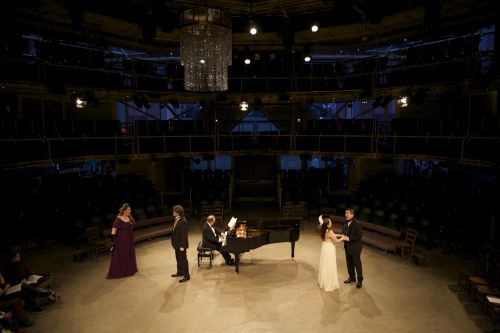 United Kingdom Fin de Siècle – A Day of Song: Royal Northern College of Music. Royal Exchange Theatre, Manchester. 27.4.2014.
United Kingdom Fin de Siècle – A Day of Song: Royal Northern College of Music. Royal Exchange Theatre, Manchester. 27.4.2014.

This Day of Song was the inspiration of soprano Lynne Dawson, now Head of School of Vocal Studies at Manchester’s Royal Northern College of Music. However, with the Concert theatre at the main college undergoing major refurbishment the event was moved to the City Centre – to the building the IRA failed to destroy on that day in 1992 when they targeted Manchester. The graceful stone faced building has ceased to be the local Stock Exchange and the great central space, where jobbers and dealers did business, is now filled with a suspended theatre in the round. With only a piano as props the students and their piano accompanists set out to create the atmosphere of a salon. The title given to the day was Fin de Siècle: The voice of Europe at the end of the 19th century. The day started with an Introductory talk by Dr Francis Toase giving an overview of the political and social scene in 1890s Europe. Various programmes followed this during the day, the titles indicating the content of each that extended from Victorian England, through Junge Lieder, La Belle Époque, Risorgemento and Fin de Siècle that was open to the press and on which I comment below.
The Fin De Siècleprogramme, featuring seven sopranos, one mezzo, one tenor and a quartet of voices in an extract from act three of Puccini’s La Boheme was wide ranging. It started with Gabriel Fauré’s Cinq Mélodies sung by Catrin Woodruff. This was followed by Chabrier’s Vilanelle and Satie’s Je te veux sung by Jenny Carson. Both singers sang in good French and with a pleasing range of expression, although more variety of colour will come as they train. Works by Lisa Lehmann, Lehar and Mahler followed, sung by Rosanna Harris, Victoria Wilkie, Joanna Norman and Lauren Fielder respectively. Each soloist brought different skills. Miss Wilkie, complete with fan, was creamy toned, Joanna Norman acted with body and voice in Mahler’s Trost Um Unglueck as well as good colour; Lauren made a good impression in Madchen.
After the clutch of sopranos it was good to hear tenor Timothy Langston in two Tosti songs, Tristezza and Non t’amo piu, bringing back memories of Gigli and Schipa in the days of 78pecords. Bringing plenty of rich tenor tone, excellent diction and smooth divisions he softened my chagrin at not hearing Chinese tenor Kang Wang earlier in the afternoon singing the composer’s Serenata, Ideale and Preghiera. I had not long to wait lo hear him as he was the Rodolfo in the act three quartet from La Bohème. I have admired his singing in the college production of L’Elisir dAmore (see review). His singing in the heavier musical patina of Puccini, served to convince me that his tonal beauty and ability to create a character portend a good career. Joanna Norman joined him as a well acted and tonally secure Mimi, with Lauren Fielder as Musetta, both confirming the qualities exhibited in their Mahler solo songs. As Marcello the baritone Benjamin Lewis had good vocal colour and range of expression; he will doubtless develop greater vocal strength.
The evening concluded with mezzo Penelope Coussland singing Sea Slumber Song, Sabbath Morning at sea and Where Corals lie from Elgar’s Sea Pictures with soft, rich and even expressive tone with plenty in reserve I suggest. Emma-Claire Crook had the taskof concluding the evening with Richard Strauss’ Ruhe, meine Seele, Cäcilie, Heimliche Aufforderung and Morgen. It was some task, particularly with Michael Kennedy, renowned Strauss specialist and awardee of a major prize at the RNCM for the singing of the composer’s music, present in the audience! He doubtless would have detailed comments to make. Suffice it for me to write that Emma-Claire sang with clear simplicity and a seductive final phrase to Morgen that was a fitting conclusion to a musically diverse evening from the end of the nineteenth-century – a century that had seen Rossini and the great bel-cantists as well as Verdi and Puccini in Italy, Wagner in Germany, the Mighty Handful in Russia and a clutch of French composers of diverse genres, a century never seen before and showing little chance of repeat any time soon.
In conclusion, the day and the evening, whilst owing much to the conception by Lynne Dawson, would not have been possible without the contribution of the piano accompanists. All contributed with professionalism and no little stylistic élan.
Robert J Farr
.